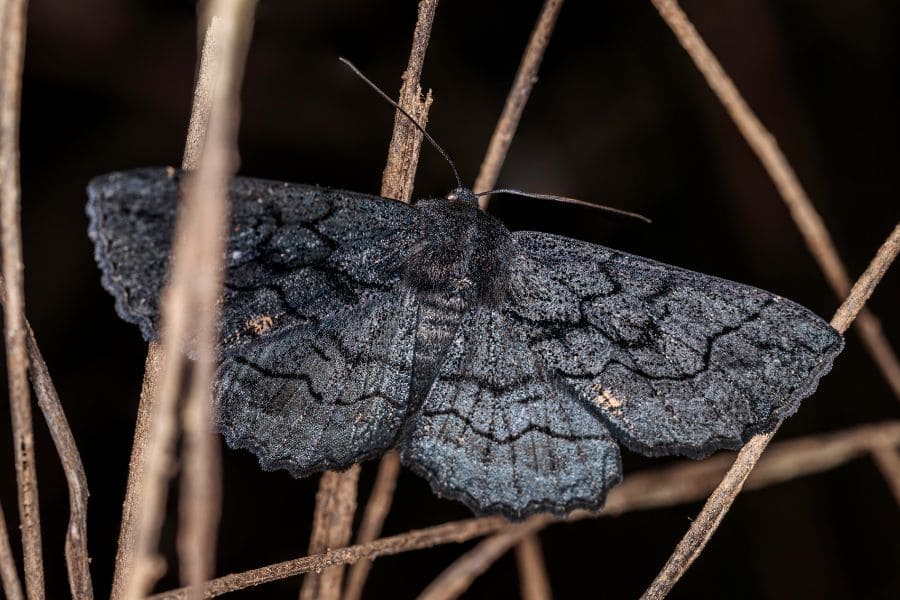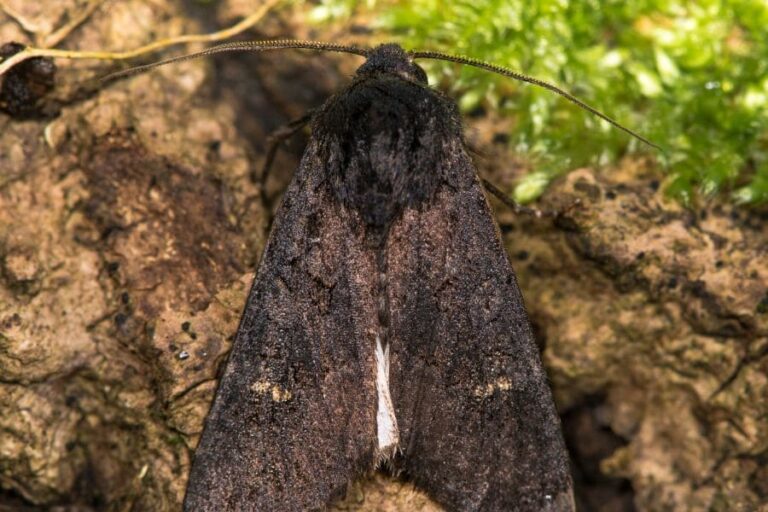A black moth can symbolize various things depending on cultural and personal interpretations. Common associations include transformation, mystery, death or the afterlife, spiritual awakening, seeking truth or clarity, endings and beginnings, and protection. The symbolism can vary widely and is subject to individual and cultural beliefs.
How did Egypt view black moths in ancient times?
These interpretations provide a fascinating glimpse into the human fascination with the natural world and our inclination to attribute meaning to it.
Egypt: In ancient Egyptian culture, symbolism played a significant role in everyday life. The color black was often associated with death and rebirth, making the black moth a symbol of transformation.
The Egyptian belief in the afterlife also connects with the symbolism of black moths, as they were seen as guides for souls on their journey to the underworld.
Black moths may have been linked to the nocturnal cycle, representing the transition from day to night and back to day, mirroring the cycle of life, death, and rebirth.
Greece: Ancient Greek mythology frequently used moths and other insects as symbols. The black moth, in particular, was associated with the goddess Nyx, who personified the night.
The presence of black moths in Greek mythology could signify the mysteries of the night and the hidden aspects of existence.
Moths were also associated with the concept of metamorphosis, echoing the transformation of caterpillars into moths, and symbolizing personal growth and evolution.
Native American Tribes: Different Native American tribes had diverse interpretations of black moths. However, many viewed them as symbols of secrets, mystery, and intuition.
In some tribes, black moths were seen as messengers between the spirit world and the physical world, carrying important messages to the living.
The appearance of a black moth in Native American folklore might be seen as a sign to pay attention to one’s inner wisdom and spiritual journey.
Literary References

Famous Literature : In literature, the symbolism of black moths has been used to convey various themes and emotions. For example, in Gothic literature, black moths are often associated with death and the macabre.
Edgar Allan Poe’s poem “The Death of a Beautiful Lady” uses the image of a black moth to symbolize the intrusion of death into the beauty of life.
Black moths have also appeared in works of literature as symbols of transformation, symbolizing characters’ personal growth or their journey through dark and challenging times.
Folklore and Myths : Folklore and myths from various cultures often feature black moths as symbols with rich meanings.
For example, in some Native American myths, the black moth is a creature of the night and is closely tied to the moon and lunar cycles.
In other cultures, black moths may represent omens, with their presence foretelling significant events or changes in a person’s life.
In some folklore, black moths are associated with witches and the supernatural, adding an element of fear and mystery to their symbolism.
What does a yellow moth symbolize?
Moths come in a wide range of colors, and the symbolism associated with each color can vary significantly. Comparing these colors can provide insights into the nuanced meanings attributed to different moths.
Variations in Symbolism
White Moths: White moths are often seen as symbols of purity, innocence, and spirituality. They are sometimes associated with angels or divine messengers in various cultures.
In some cultures, white moths are believed to be the souls of departed loved ones, visiting to provide comfort or guidance.
White moths may also symbolize transformation and a fresh start, similar to the white color’s association with blank slates and new beginnings.
Yellow Moths: Yellow moths are typically associated with hope, optimism, and positive change. Their bright color is often linked to the warmth and energy of the sun.
In some cultures, yellow moths are considered symbols of good luck and abundance, bringing prosperity and happiness.
In addition, yellow moths may also symbolize creativity and inspiration, as the color yellow is often associated with mental clarity and innovative thinking.
Red Moths :
Red moths are often associated with passion, love, and strong emotions. The color red is inherently intense and evokes feelings of desire and intensity.
In certain cultures, red moths may symbolize courage and strength, as red is a color often associated with vitality and power.
Conversely, red moths can also represent warning signs or danger, as the color red is frequently used for cautionary purposes, such as stop signs.
Brown Moths : Brown moths are often seen as symbols of stability, grounding, and reliability. The color brown is associated with the earth and natural elements.
In some cultures, brown moths represent a connection to the land and a reminder of our roots. They may symbolize the need to stay grounded and focused on the basics of life.
Brown moths can also symbolize humility and simplicity, as brown is often a muted and unassuming color.
How do black moths symbolize death in Western Europe?
It’s crucial to recognize that these interpretations of black moth symbolism in different cultures are not exhaustive, and there can be variations within each culture and region.
Europe
Western Europe : In Western Europe, particularly in countries with a Christian heritage, black moths are often associated with death and the afterlife. This connection comes from their similarity to funeral attire and the concept of darkness signifying the unknown or the mysterious.
Moreover, black moths may be seen as omens of impending death or as messengers from the spirit world. They are sometimes thought to carry the souls of the departed or to announce the passing of a loved one.
In some Western European folklore, black moths are believed to be witches or evil spirits in disguise, adding an element of fear and caution.
Eastern Europe : Eastern European cultures may share some of the Western European symbolism, but there are also variations. Black moths can symbolize the cycle of life and death, representing both endings and new beginnings.
In some Eastern European folklore, black moths are associated with protective spirits or ancestors who watch over the living. They are seen as messengers of wisdom and guidance.
Furthermore, the symbolism of black moths in Eastern Europe may also tie into Slavic mythology and folklore, where the natural world is rich with symbolism and significance.
Asia
China : In Chinese culture, black moths are associated with various meanings, including transformation, endurance, and the lunar cycle. The moth’s attraction to light is seen as a metaphor for seeking enlightenment and knowledge.
Black moths are sometimes considered symbols of rebirth and personal growth. Their ability to navigate darkness is seen as a reminder to find one’s way through life’s challenges.
Furthermore, the connection between black moths and the moon also ties into Chinese beliefs about balance and harmony, as well as the cyclical nature of life.
Japan
In Japan, moths, including black ones, have been associated with death and the impermanence of life. This symbolism is linked to their attraction to light, which can represent the transient nature of existence.
Furthermore, black moths may also symbolize transformation and personal growth in Japanese culture. The process of metamorphosis, from caterpillar to moth, is seen as a reflection of personal development.
Additionally, black moths in Japanese art and literature can evoke a sense of melancholy and nostalgia, as they are often featured in works exploring themes of impermanence and beauty.
Africa
African cultures are incredibly diverse, and the symbolism of black moths can vary significantly from region to region. In some African societies, black moths may be associated with ancestral spirits or as messengers from the spirit world.
Black moths might also be seen as symbols of protection or as omens, depending on the specific beliefs of the culture.
Moreover, it’s important to note that Africa’s vast cultural diversity means that interpretations of black moths can differ widely across the continent.
Americas
North America : In Native American cultures, black moths may be seen as symbols of transformation and change. They are sometimes regarded as messengers from the spirit world or as guides for souls on their journey.
Moreover, black moths can also be seen as symbols of intuition and inner wisdom, encouraging individuals to trust their instincts and embrace personal growth.
In some Native American tribes, the appearance of a black moth is considered a significant spiritual sign or a reminder to reconnect with one’s spiritual path.
South America : In South American cultures, the symbolism of black moths can vary widely, but they are often associated with mystery and the hidden aspects of life.
Moreover, black moths may be linked to night and darkness, representing the unseen or the subconscious mind. They can symbolize the need to explore one’s inner self.
In some South American folklore, black moths may be tied to shamans or spiritual guides who navigate between the realms of the living and the spirit world.
Australia
In Australian Indigenous cultures, the symbolism of black moths can vary among different tribes and regions. Moths, including black ones, are often associated with nocturnal creatures and the cycle of day and night.
Black moths may be seen as symbols of transformation and renewal, echoing the patterns of life in the Australian natural environment.
Furthermore, the cultural significance of black moths in Australia may also relate to specific Dreamtime stories and the spiritual beliefs of different Aboriginal groups.
What are modern interpretations of black moths?

The presence of black moths in contemporary symbolism and popular culture illustrates their enduring capacity
Modern Interpretations
In modern times, black moths have taken on new symbolic meanings that often reflect the challenges and complexities of contemporary life.
In addition, black moths can symbolize resilience and adaptability, as they are creatures that thrive in diverse environments and are drawn to artificial light sources, suggesting an ability to navigate through man-made challenges.
Some individuals view black moths as symbols of the unknown and the mysteries of the universe, representing the unexplored frontiers of science and space.
Environmental and Ecological Significance
The symbolism of black moths also extends to environmental and ecological concerns. The presence or absence of certain moth species, including black moths, can be indicative of changes in ecosystems.
In regions where light pollution is a significant issue, black moths may symbolize the impact of human activities on wildlife and the need for conservation efforts.
Furthermore, black moths can also serve as reminders of the interconnectedness of all species and the importance of preserving biodiversity.
Personal and Psychological Meanings
On a personal level, black moths can take on unique meanings for individuals based on their life experiences and beliefs.
Some people may see black moths as symbols of personal transformation and the ability to overcome challenges, drawing inspiration from the moth’s journey from caterpillar to adult.
Black moths may also represent introspection and the need to explore one’s inner self, similar to the symbolism of darkness as a realm of self-discovery.
In psychology, the presence of black moths in dreams or as recurring symbols can be subject to individual interpretation, potentially reflecting personal fears, desires, or unresolved issues.
FAQ’s
Are black moths lucky?
The belief in whether black moths are lucky or not varies among different cultures and individuals. In some cultures, black moths are associated with negative omens, while in others, they may be seen as symbols of transformation and change.
What does it mean if a moth visits you?
The presence of a moth can have different interpretations depending on personal beliefs. Some people view it as a message from the spirit world or a symbol of transformation and intuition. Others may see it as a simple encounter with a nocturnal insect.
What does a moth symbolize spiritually?
Spiritually, moths are often seen as symbols of transformation, rebirth, and intuition. Their attraction to light can be interpreted as a metaphor for seeking spiritual truth or guidance in the darkness of ignorance.
Are moths good luck to see?
Whether moths are considered good luck to see or not varies across cultures and superstitions. Some believe that encountering a moth is a sign of good fortune, while others may associate it with impending change or caution.
What color attracts moths?
Moths are typically attracted to light sources, regardless of color. However, they tend to be more drawn to white or yellow light. Ultraviolet light, which is often emitted by white surfaces, is particularly attractive to moths.
What does a black butterfly symbolize?
Black butterflies, like moths, can symbolize transformation, change, and rebirth. In some cultures, they are associated with death or the afterlife. The interpretation of a black butterfly’s symbolism can also depend on personal beliefs and cultural context.
Final Thought
In summary, black moths have a rich and varied symbolism that spans across different times, cultures, and forms of art. In the past, they were often linked to ideas of change and death, but nowadays, they can represent strength, our environment, and personal growth.
Moreover, these moths also have a significant presence in popular culture, influencing how stories are told in literature, movies, music, and art. Overall, the symbolism of black moths highlights our deep connection to the natural world and the enduring quest for meaning in our lives.

